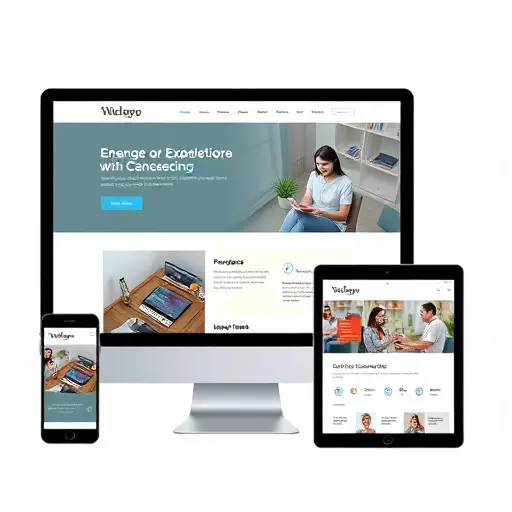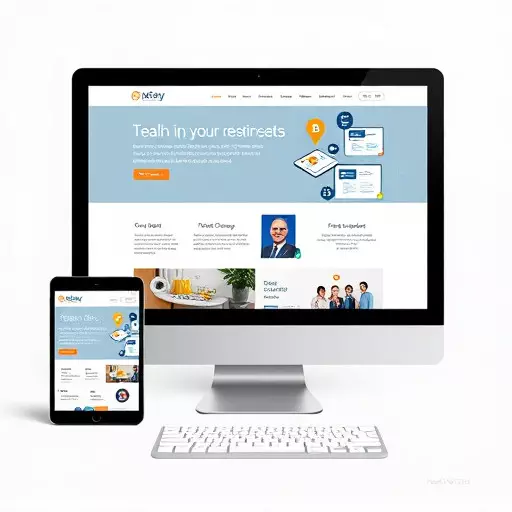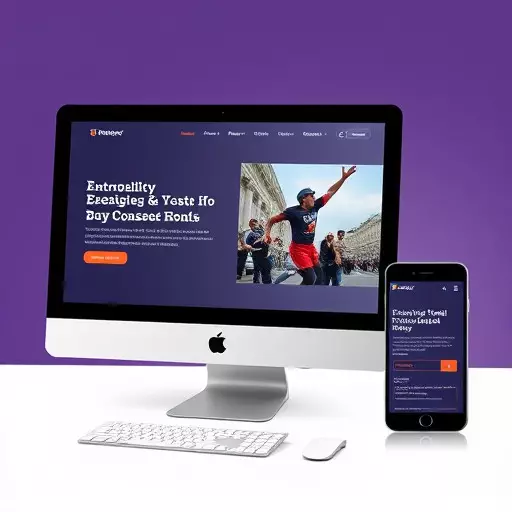In the competitive market for custom website development in New Jersey, a strong focus on user experience (UX) and user interface (UI) design is essential for digital success. Responsive web design ensures websites adapt seamlessly to various devices, enhancing accessibility and user satisfaction. UX design, by prioritizing user-centric approaches, creates intuitive navigation and visually appealing layouts, improving engagement and conversion rates. New Jersey businesses that integrate these principles gain a competitive edge, offering memorable online experiences that cater to diverse audiences across different platforms.
“Discover the art and science of User Experience (UX) design, a cornerstone for digital success. From understanding user needs to unlocking the potential of responsive web design and custom website development in New Jersey, this article offers a comprehensive guide.
Learn how UI design enhances UX, explore key principles for effective strategies, and understand the iterative process of continuous improvement. Additionally, we’ll delve into the significant impact of UX on business growth, highlighting its relevance in today’s digital landscape.”
- Understanding User Experience (UX) Design: A Foundation for Digital Success
- The Role of Custom Website Development in Enhancing UX
- Responsive Web Design: Ensuring a Seamless User Journey Across Devices
- Unlocking the Power of User Interface (UI) Design within UX
- Key Principles of Effective UX Design Strategies
- Measuring and Iterating: Continuous Improvement in UX
- The Impact of UX on Business Growth: A New Jersey Perspective
Understanding User Experience (UX) Design: A Foundation for Digital Success

Understanding User Experience (UX) Design is a cornerstone in achieving digital success for any business, especially those looking to excel in the competitive market of Custom Website Development New Jersey. UX design focuses on enhancing user interaction and satisfaction by creating intuitive, accessible, and enjoyable digital experiences. It involves a deep understanding of user needs, behaviors, and motivations, which are then translated into well-structured information architectures, wireframes, and visual designs, ultimately resulting in a seamless User Interface (UI) design.
By prioritizing UX, businesses ensure their websites are not just visually appealing but also functional and easy to navigate. Responsive web design is a key aspect of modern UX, ensuring that sites adapt gracefully across various devices and screen sizes. This adaptability not only improves accessibility but also boosts user retention and engagement, playing a significant role in the success of any online venture.
The Role of Custom Website Development in Enhancing UX

In today’s digital landscape, a seamless and engaging user experience is paramount for any business seeking to thrive online. Custom website development in New Jersey plays a pivotal role in achieving this by allowing designers to create unique, tailored solutions that go beyond off-the-shelf templates. By employing responsive web design, developers ensure the site adapts beautifully across various devices, from desktops to smartphones, providing a consistent experience regardless of the user’s access point.
This level of customization extends into User Interface (UI) and User Experience (UX) design, where professional developers can integrate intuitive navigation, visually appealing layouts, and dynamic interactions. A well-executed custom website doesn’t just look good; it enhances user engagement by streamlining tasks, simplifying complex processes, and delivering content in a way that resonates with the target audience. The result is increased user satisfaction, higher conversion rates, and a competitive edge in the market.
Responsive Web Design: Ensuring a Seamless User Journey Across Devices

In today’s digital landscape, where users access information and interact with websites across a myriad of devices, responsive web design has become an indispensable aspect of custom website development in New Jersey. This approach ensures that a website seamlessly adapts to different screen sizes and resolutions, providing an optimal user experience regardless of whether the visitor is on a desktop computer, tablet, or smartphone. By implementing responsive user interface (UI) design principles, web developers create a unified front-end architecture that offers a consistent and intuitive navigation structure across all platforms.
User experience (UX) design plays a pivotal role in this process by focusing on user needs and behaviors. Responsive UX design goes beyond technical implementation; it emphasizes creating a seamless journey for users as they transition between devices. This includes ensuring touch-friendly interfaces, optimized loading times, and intuitive layouts that facilitate easy navigation and interaction. By prioritizing these aspects, businesses can enhance customer satisfaction, increase engagement, and foster stronger connections with their audiences.
Unlocking the Power of User Interface (UI) Design within UX

In the realm of custom website development in New Jersey, User Experience (UX) design is not complete without a strong foundation in User Interface (UI) design. UI design plays a pivotal role in transforming abstract ideas into tangible, user-friendly digital experiences. It involves crafting intuitive layouts, visually appealing elements, and seamless interactions that captivate users and encourage them to explore further. A well-designed UI ensures that the website is not just aesthetically pleasing but also responsive across various devices and screen sizes, adhering to principles of responsive web design.
By integrating custom UI elements tailored to specific user needs, businesses can significantly enhance UX. This involves understanding user behavior, creating wireframes, and testing prototypes to ensure every interaction feels natural and intuitive. A harmonious blend of effective UI and thoughtful UX design creates a memorable digital journey, fostering user engagement and driving successful online conversions for any New Jersey-based business venture.
Key Principles of Effective UX Design Strategies

Effective UX design strategies are built on a foundation of key principles that enhance user satisfaction and engagement. One of the cornerstones is user-centric design, which places the needs, goals, and behaviors of the target audience at the forefront. Custom website development in New Jersey should reflect these insights, ensuring every element serves a purpose in guiding users to achieve their desired outcomes. By understanding user personas and conducting thorough research, designers can create intuitive and accessible interfaces.
Responsive web design is another vital principle, ensuring that digital products adapt seamlessly to various devices and screen sizes. This approach guarantees consistent user experiences across desktops, tablets, and mobile phones, capturing a broader audience. Additionally, maintaining a clean and intuitive user interface (UI) design enhances usability by minimizing clutter and providing clear visual hierarchy. Balancing aesthetics with functionality is key to creating interfaces that not only look appealing but also enable users to navigate and interact effortlessly.
Measuring and Iterating: Continuous Improvement in UX

In the dynamic world of digital solutions, User Experience (UX) design stands as a cornerstone for any successful online venture, particularly in the context of Custom Website Development New Jersey. It’s not just about creating visually appealing pages; it’s about crafting interfaces that users find intuitive and enjoyable. Measuring UX involves gathering user feedback through various methods like surveys, heatmaps, and A/B testing to understand pain points and areas for improvement.
Iterative design is a key principle in this process. After analyzing data, designers can make informed changes to the User Interface (UI) and implement new features based on what users need. This continuous improvement ensures that the website stays relevant, engaging, and aligned with user expectations. Responsive web design plays a crucial role here by adapting to different screen sizes and devices, providing a seamless UX regardless of the user’s access point.
The Impact of UX on Business Growth: A New Jersey Perspective

In today’s digital landscape, User Experience (UX) design plays a pivotal role in driving business growth, and New Jersey is no exception. A well-crafted UX isn’t just about aesthetics; it’s the key to retaining users and fostering loyalty. By focusing on intuitive navigation, seamless interactions, and visually appealing layouts, custom website development in New Jersey can transform a mere online presence into a powerful tool for success. Responsive web design, tailored to various devices and screen sizes, ensures a consistent user experience across all platforms—a must-have for businesses aiming to thrive in the competitive market.
New Jersey’s thriving tech scene highlights the demand for expert UX/UI designers who can create interfaces that balance functionality with aesthetics. A custom website, designed with a deep understanding of target audiences and industry trends, can significantly impact business growth by enhancing conversion rates, improving customer satisfaction, and setting companies apart from their competitors. With a strong focus on UX, New Jersey businesses can leverage their online presence to build a solid foundation for future success and stay ahead in the ever-evolving digital world.


